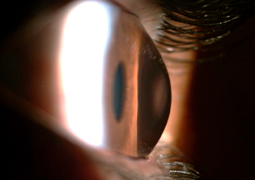Aim: To determine risk factors associated with keratoconus in Bucaramanga, Colombia.
Material and Methods: A paired case-control study was conducted at Bucaramanga, Colombia, between November 2022 and December 2023. The controls were age- and sex-matched. Patients answered a questionnaire designed for this study regarding their family history of keratoconus, eye rubbing, atopy, sun exposure, and sleeping habits. Information from medical records was also obtained. Univariate and multivariate conditional analyses were used to test the significance of associations.
Results: One hundred fifty-six patients with a diagnosis of keratoconus and 312 controls were included. Univariate analyses revealed significant differences between cases and controls in the following factors: very frequent eye rubbing (OR = 20.9, 95% CI 6.2–70.1), a positive family history of keratoconus (OR = 13.0, 95% CI 5.5–30.8), a personal history of atopy (OR = 2.2), and nocturnal eye compression (OR = 1.7, 95% CI 1.0–2.7). Multivariate analysis showed a statistical significance for eye rubbing (OR = 6.9, 95% CI 3.8–12.5), and family history of keratoconus (OR = 10.3, 95% CI 2.3–44.9). There was a significant mild interaction between both, since when the two coincided the OR increased up to 74.1 times.
Conclusion: Eye rubbing and family history of keratoconus were the most important risk factors for keratoconus in our population. Although it is impossible to establish causal relationships, our results suggest that controlling eye rubbing could be a potentially useful preventive measure, particularly in individuals with a family history of keratoconus. Other factors, such as sun exposure, sleeping position, and atopy, may play a role in the pathophysiology of the disease.

